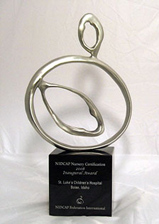Newborn Individualized Developmental Care and Assessment Program (NIDCAP), developed by Heidelise Als, PhD and her colleagues, is a comprehensive approach to care that is developmentally supportive and individualized to the infant’s goals and level of stability. Further it seeks to support families and the professionals who care for them. It provides and trains professionals within this NIDCAP framework.
One component of the model of care is the direct observation of the infants within their environments in the newborn intensive care setting. Using a detailed observational tool, often referred to as the NIDCAP observation, the infant’s behaviors can be interpreted as steady and relaxed or as representing stress or discomfort. By observing and then interpreting behaviors of infants within their environment and as reactions to care they receive, developmental care plans can be developed, with the caregiving team, that best support’s the infant’s overall goals and efforts at self regulation.
The NIDCAP model, which includes this observation, describes the development of an ever-more supportive and developmentally appropriate nursery environment (from the actual physical space to the delivery of care), and interrelated, the increasing nurturance of the family and the staff, and the continued education and mutual collaboration of the staff (from the direct caregivers through the administrative leadership).
The NIDCAP approach to care requires in-depth training and provides in turn a highly valuable resource in support of developmental support and care provision by professionals and families.

